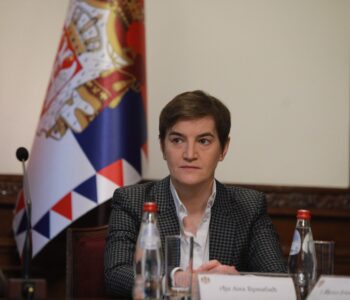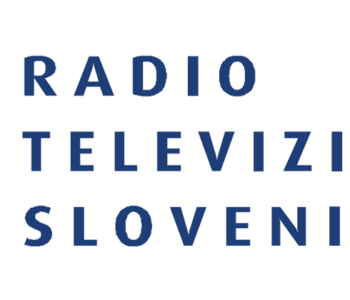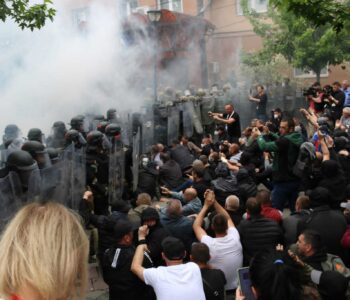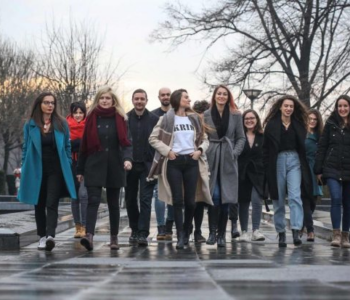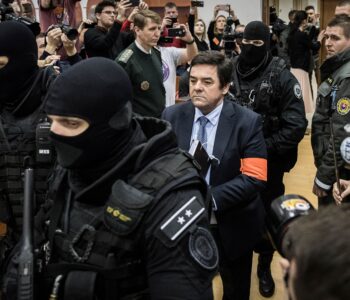Protests continue in Belgrade. The demonstrations of May 8, 12, and 19 were followed by others on May 26 and 27, organised by the government and the opposition respectively.
The demonstrations managed to bring tens of thousands of people to the streets and block the main arteries of the Serbian capital. If initially composure and pain for the victims of the massacres that have marked the country in recent weeks prevailed, the protests have gradually articulated specific requests to the government, which so far has refused to respond.
Some concern the situation of the media in Serbia and the passivity of the institutions in countering the violence present in the media space. Protesters ask for a ban on media and tabloids that promote violence and hatred, and for an end to programmes – such as some reality shows – that promote aggressive, violent, and immoral behaviour, and finally for the resignation of the entire media regulator institution (REM).
The connection between the massacres and the demands of the protests in Belgrade
While at the moment it seems difficult to find a direct causal link between the mass massacres and the demands of protesters, the accusations leveled against the government are those of having created a media system that not only tolerates, but actually promotes violence.
This connection emerges clearly in the case of the second massacre. The perpetrator of the Mladenovac massacre had as his idol a certain Aleksandar “Kristijan” Golubović, a well-known protagonist of some reality shows, including “Zadruga”, broadcast on Pink television.
Golubović’s “curriculum” speaks volumes: multiple offender for drugs and armed robberies, MMA fighter, he boasted, rightly or wrongly, of friendships with characters such as Arkan, a notorious paramilitary leader during the conflicts of the 90s, and Ulemek “Legija”, the person responsible for the killing of Prime Minister Zoran Đinđić.
In recent years, Golubović has become a star of reality shows that competed for him and the protagonist of numerous episodes of violence, insults, fights, including strangling his partner until she was knocked unconscious. Golubović’s is not an isolated case, similar episodes abound in reality shows and on Serbian television. In addition to common criminals on reality TV, war criminals are also regularly hosted in talk shows as experts on geopolitics or military matters in what is a real glorification of violence.
The role of private TVs
Private television stations RTV Pink and Happy TV are most likely to broadcast reality shows and violence. Nonetheless, last July these two television station were assigned a national frequency for the second consecutive time.
This was criticised by civil society and trade associations: the numerous complaints for incitement to hatred and violence had not been taken into account by the REM which reassigned the frequencies to RTV Pink and Happy TV as well as B92 and Prva TV, two other private TVs, still close to the government but whose contents have not attracted the same criticisms as RTV Happy and Pink.
This decision was also criticised in the progress report on Serbia’s EU accession and by the ODIHR report on the 2022 elections, which had underlined how the REM had tolerated violations of the electoral campaign rules by the four nationwide televisions.
In recent years, Happy and Pink have often been at the centre of controversy and scandals, but have never been subject to significant sanctions. The reason for this, most likely, is that these broadcasters have a very close link with politics and are essentially considered personal instruments of political power in Serbia and in particular of President Vučić, who is a regular guest: one of Vučić’s first TV appearances after the massacres was on Happy TV.
In this perspective, as highlighted by the lecturers of the Faculty of Political Sciences Jelena Đorđević and Rade Veljanovski in an interview for Radio Slobodna Evropa, the violence in media tones and contents is nothing but the reflection of the political discourse and, at the same time, these stations are the pillars on which the Vučić regime relies, in a similar way to what happened in the 1990s with state television.
The comments of the REM and of the TV stations
In front of the demands of the protests, the REM has taken defensive positions. In a statement released on May 11, President Olivera Zekić said that while their resignations should be discussed in Parliament, we should also discuss how a part of society and the media wants to blame the REM for these terrible tragedies in Serbia.
Zekić then reiterated that the repeated attacks against the REM are not only shameful, but could even lead to further violence. The president’s statements were followed by similar statements by REM vice-president Milorad Vukašinović a few days later: “I fear that the instigators of the attacks against the integrity of the REM […] are in the headquarters of some media”. Pressed later on the role of Kristijan Golubović on television, Vukašinović replied that media regulators cannot limit the rights of citizens who have already served sentences, unless this is provided for by these sentences.
However, another member of the REM, Judita Popović, admitted that for years the media have favoured incitement to hatred, violence, and discrimination and that no one has reacted, but in fact certain media have been rewarded with national frequencies. Resignations are not enough, said Popović, REM members should be held responsible for certain situations.
The words of the members of the REM were echoed by the Minister of Information, Mihailo Jovanović, who rejected as unacceptable the demands to close both RTV Pink and Happy TV, as such requests would be contrary to freedom of expression, a fundamental pillar of any democratic society.
A hint of self-criticism comes from Željko Mitrović, the owner of Pink, who entered the house where the “Zadruga” reality show is held and announced that this is the last season of the reality show, which will change from next year. Subsequently, Mitrović himself announced that “Zadruga” will cease to be broadcast within ten days at the latest and that this was a request made by Vučić himself. We will see if the words will be followed by deeds.
Conclusions
The protests are creating a lot of nervousness within the Serbian government and seem to focus on the passivity of the REM and the sensationalist approach of private national televisions, which are often the favorite stage of the SNS, the president’s party.
The REM and the Minister of Information have hidden behind a formal approach of defense of the institutions and freedom of the right of expression, without however emphasising how the same right of expression must be regulated within Serbian society. In this sense, an article by the Centre for Investigative Journalism in Serbia (CINS) is illuminating, which explains that the problems do not arise from the fact that the regulations are not adequate but from the fact that they are not applied.
For example, in January of this year alone, within the famous reality show “Zadruga”, there were more than ten controversial episodes as documented in a complaint filed by the Institute for Media and Diversity (MDI). This complaint has not been acted upon: in the last 5 years the REM has not ordered any measures against RTV Pink for its problematic contents and this happens because the law is not applied adequately and broadcasts with high audience ratings such as reality shows they are considered untouchable. As demonstrated by the CINS, the REM has remained silent in these cases. And it is precisely against this silence that citizens are now protesting.
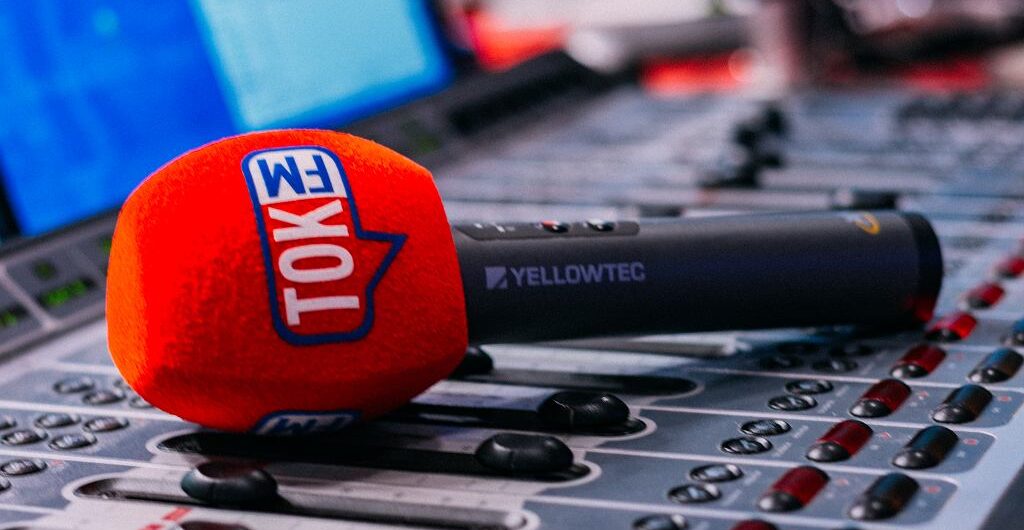 Library
Library

